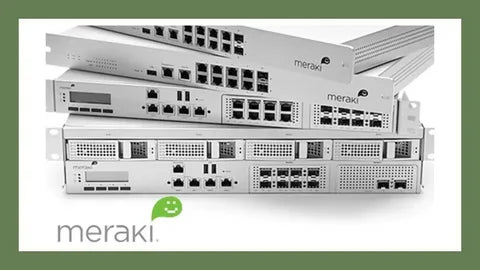
Meraki MX250 vs MX105: Choosing the Right Security Appliance for Your Enterprise
When it comes to securing enterprise networks, Meraki MX250 and Meraki MX105 are two of the leading options in Cisco's Meraki line of security appliances. Both devices provide excellent performance, but understanding the key differences can help you decide which one is best for your organization’s specific needs. This comparison will look at their features, performance benchmarks, and ideal deployment scenarios to help you choose the right security solution.
Key Features of the Meraki MX250
The Meraki MX250 is designed for larger organizations that require a higher level of security and performance. Its key features include:
-
High Throughput and Scalability
The MX250 can handle high bandwidth usage and supports up to 4 Gbps of firewall throughput. This makes it ideal for medium to large enterprises that need high-performance security without compromising on speed. -
Advanced Security Features
The MX250 includes Meraki’s full suite of security features, such as Advanced Malware Protection (AMP), intrusion detection and prevention (IDS/IPS), and content filtering. These features work seamlessly to protect your network from evolving threats. -
Dual-WAN and High Availability
The MX250 supports dual-WAN connections, offering redundancy and ensuring that your network remains operational even if one connection goes down. This feature is essential for businesses that require always-on connectivity. -
Cloud-Managed Networking
Like all Meraki products, the MX250 is managed through the Meraki cloud dashboard. This cloud-based management system allows IT administrators to monitor network activity, configure security settings, and deploy updates remotely—saving time and resources. -
VPN and Site-to-Site Connectivity
With support for site-to-site VPNs and client VPNs, the MX250 provides secure remote access, making it an ideal choice for businesses with multiple locations or a distributed workforce.
Key Features of the Meraki MX105
The Meraki MX105 is a smaller, more cost-effective security appliance that offers a robust feature set for small to medium-sized businesses. Here’s what the MX105 brings to the table:
-
Firewall Throughput
The MX105 supports up to 1.5 Gbps of firewall throughput, which makes it suitable for businesses with moderate internet usage. It may not offer the high bandwidth support of the MX250, but for smaller networks, it provides an efficient solution. -
Integrated Security Features
Similar to the MX250, the MX105 offers advanced security features, including Advanced Malware Protection, IDS/IPS, and content filtering. These built-in tools offer comprehensive network protection without additional hardware or software. -
Cloud-Based Management
Just like the MX250, the MX105 is managed via Meraki’s cloud-based dashboard, ensuring simplicity and ease of use for network management. -
Basic VPN Capabilities
The MX105 also supports site-to-site VPN and client VPN options, although it may not be as robust as the MX250 in terms of handling multiple simultaneous connections or high-performance VPN traffic. -
WAN and LAN Ports
The MX105 comes with 8 Gigabit Ethernet ports, offering sufficient connectivity for small to medium-sized networks. While it lacks some of the advanced WAN features found in the MX250, it provides reliable performance for standard deployments.
Performance Benchmarks: Meraki MX250 vs MX105
In terms of performance, the MX250 is clearly superior to the MX105. Here are some benchmarks that set the two models apart:
-
Firewall Throughput: The MX250 offers up to 4 Gbps, while the MX105 provides 1.5 Gbps. For businesses with higher internet traffic or demanding security needs, the MX250 will deliver superior throughput.
-
VPN Throughput: The MX250 supports more extensive VPN throughput, making it better suited for large organizations with remote offices or employees. The MX105, while adequate, may struggle with multiple simultaneous VPN users.
-
Redundancy and Reliability: With its dual-WAN support, the MX250 offers greater reliability in case of internet failure. The MX105, however, lacks this feature and may not provide the same level of uptime.
Ideal Deployment Scenarios for Meraki MX250 and MX105
Understanding your enterprise's size, network demands, and budget is crucial in selecting the right security appliance.
Meraki MX250: Best for Large Enterprises and High-Demand Networks
If your organization has high internet traffic, multiple branches, or a large number of employees working remotely, the Meraki MX250 is your ideal choice. Its ability to handle large-scale network traffic, its superior VPN capabilities, and its high throughput make it perfect for:
-
Medium to large businesses
-
Organizations with remote offices or remote workers
-
Enterprises requiring robust security with high uptime
-
Companies with large internet traffic or demanding applications
Meraki MX105: Best for Small to Medium Businesses
On the other hand, the Meraki MX105 is a cost-effective option for small to medium-sized businesses that need solid network security without the high-end features of the MX250. It’s suitable for:
-
Small to medium enterprises
-
Businesses with lower bandwidth needs
-
Organizations with fewer remote workers or locations
-
Companies on a budget but still requiring robust security
Conclusion: Which Meraki Appliance is Right for Your Enterprise?
Both the Meraki MX250 and Meraki MX105 are excellent choices for securing your network, but the decision ultimately depends on your organization’s size, performance requirements, and budget. The MX250 offers superior performance, scalability, and advanced features, making it the better choice for larger enterprises or those with high security needs. The MX105, on the other hand, provides a more affordable solution for smaller businesses that still need reliable network protection.
At iTechardware.com, we offer both models, ensuring that your enterprise has the right solution to meet its unique security needs. With Meraki’s cloud-based security appliances, you can rest assured that your network is in safe hands.